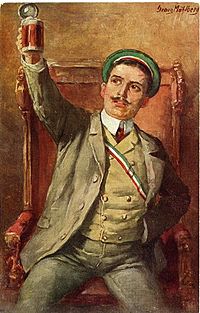Toast
A toast is made in company, before or during toasting with mostly alcoholic beverages, in the form of a speech or in verse. Its roots can be traced back to the ancient religions: the priest's libation was already offered by means of a symbolic raising of the chalice and an associated word of blessing . The oldest touts were held in honor of gods. Special forms are the toast the toast and toast .
General

Toasts can be delivered in a number of ways. In the case of a monologue, they range from a spontaneous, prosaic speech to lyrical prose and poetry . There are sometimes rites for lyrical toasts , which are intended to encourage all members of the group present to repeat or have a say.
The type and content of the toast depend on the cultural background, the occasion of the meeting and the degree of familiarity among the individual group members. The types of drinks served can also be significant. At larger gatherings or tables that were far away, an attendant was sometimes called to repeat the toasts of the gentlemen out loud. In some cultures, it is still common today for larger gatherings to have their own table masters , who are primarily responsible for making toasts.
to form

As a speech
Free speech is probably the oldest type of toast. Every culture has its own rituals. Basically every formal toast is the same that it wants to show the guests, the host or another person honor, gratitude and courtesy . In this case, the toast is equivalent to a toast .
There are of course no formal limits to the length of the toast. Sometimes toasts are written that fill several pages.
The lyrical toast
Toasts in poem form are the most memorable and probably the best known. In Germany they have been known in the form of liver rhymes since the Middle Ages . Apparently they were considered out of date in the 19th century and only came back to Germany through the British custom of toast .
Long live the poets!
The sublime buried
and the aspiring living,
sensibly governing,
deeply unfolding,
minnigly shaping,
delighted sounding delightful,
delighting singing delight ,
at experiences,
at events,
at funerals,
at celebrations
and at
other times
and occasions -
Long live all poets on earth who
are already today or will be tomorrow!
In the collective
The toast made together with the group, usually in lyrical form , often resembles a ceremonial ritual in a fixed group structure. The toast is sometimes supplemented with coordinated gestures or facial expressions.
Essentially, the common toast aims to consolidate group membership and often, more consciously perceived by the actors, to encourage all those present to get drunk quickly.
Examples
- " Cheers !" Or "Cheers!"
- "Well get it!"
- "Cheers)!"
- "Raise your glasses!"
- "To us good and nobody bad!" ( Latin "Nobis bene, nemini male." )
See also
Web links
- Helga Kotthoff: Toasts as interaction rituals , PDF 105 kB
Individual evidence
- ↑ Schuller, Wolfgang: Die Welt der Hetaeren. Famous women between legend and reality. Klett-Cotta publishing house, Stuttgart 2008.
- ↑ General German real encyclopedia for the educated classes 1847, Volume 14 , p. 314
- ↑ a b Helga Kotthoff: Toasts as interaction rituals , s. #Weblinks
- ↑ General German real encyclopedia for the educated classes 1824, 10th volume , p. 1 f. ( Toast )
- ↑ August Heinrich Hoffmann von Fallersleben - Unpolitical Songs (1840) p.189: Toasts , Breslau Schiller Festival November 10, 1835 Unpolitical Songs (1840)
- ↑ Tobias George Smollett: Humphry Klinkers Reisen . Third volume. From the English [by Johann Joachim Christoph Bode ]. Leipzig 1772, p. 115 books.google . See also Johann Friedrich Schütze: Holsteinisches Idiotikon; a contribution to the history of folk customs. First part. Hamburg 1800, p. 278 books.google : “Eine Hamb. Half-Flat German health means: We are doing well and nobody is ill! Who drinks dat nig, the haal de Düvel! "
